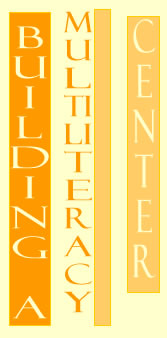

KHM: In
the past, you've used terms like "multimedia activism" or "multimedia
citizenship." Are these terms you'll develop further in your work
with multimedia literacy?
DS: Yes. I don't know about the specific language of "multimedia activism" or "multimedia citizenship." I hesitate to use terms like that because they seem to somehow make some grandiose claim for the technology or for the medium itself. It's really what people do with the medium and how citizens use multimodal communication that counts. But, I guess I would draw analogies to other compound words that are already in the lexicon. We talk about an educated, literate citizenship. We all agree, I think, that's a good thing to have. A citizenship that is able to communicate multimodally, I think, is just as important in the twenty-first century. But, yes, I think that the concepts behind those words are enduring concepts and show signs of increasing in importance rather than waning in importance.
For instance, when most people think about creating a digital video, I think even now people see that as a very arcane, specialized, limited, almost experimental thing. Writing is done as a matter of course or routine -- we do it across the disciplines, we have special classes for writing. If somebody says, "I want something to be done on the job or in the culture," in saying, "I'm going to write my congressman, an op. ed. piece, a mission statement, or something else to achieve that," that is perceived as normal. To say, "I'm going to create a digital video," is still perceived as somehow deviant or odd. Partly, I think, because in the past creating a video of any kind would have been extremely resource-intensive. It would have been a collaboration of highly trained specialists who had access to expensive, arcane equipment and who had lots of funding. You have your cameraman, your screenwriter, your designers, and depending on how extensive a production it is, you had your set designers, your art directors -- all of these people.
KHM: So, one person can't be all of that, can they? :)
DS:
Yes! I really don't want to be reductive
about what any of those people knows. All of those specialists have talents
and skills and knowledge that they've worked hard to develop. And I don't
want to be dismissive of any of that. And having worked with graphic designers
in the Multiliteracy Center, I really do appreciate the disciplinary expertise
that they have. Nevertheless, I do think that non-specialists are able
to reappropriate this medium and these technologies.
You can say the same thing about writing: we teach writing to everybody,
but that doesn't mean everyone's a professional writer. Not everybody
is a novelist or a technical writer by trade. We just see it as a general
skill. It's almost laughable to say, "Well, I don't plan to be a
writer, so I don't think I need to be literate." That's crazy. In
the same way, we'll always probably have the professionals to do certain
kinds of multimedia production. But, I also think that more and more we're
going to see multimedia production as a general skill that all of us should
have to some extent. I think you're going to see it and you already see
it.
I think you see it among, for instance, people who are graduating from
high school right now who have a camcorder and have a personal computer.
I think you see that they don't necessarily consider making a digital
video some exotic endeavor. They might see it as a fairly normal thing
to do. Increasingly, you're going to see it as considered relatively routine
to happen within the academy or within the culture, in general. To say,
"We really want to raise awareness on this issue, we really want
to communicate this message, we really want to prompt people to this action,"
you're going to see people saying, "Hey, I think a digital video
is really going to serve our purposes here. I think a website with lots
of photographs, and charts and diagrams, is going to really serve our
purposes here. We're not going to go contact an advertising company. We
don't have the budget to do that. We're going to make it ourselves."
Even twenty years from now, people are going to look back and say, "Gosh,
they thought that making a digital video was some weird thing that you
do, but we just see it as something you do for the heck of it."
KHM: We also want people to think of communication mediums, like digital video, as offering us more possibilities for ways we can communicate, not that they limit or reduce our messages. Teaching people to utilize new mediums in ways that expand our notions of communicating is really important.
DS:
Exactly. A related concern is the fact that because of the technology
and how resource-intensive it has been to use it, many of the models we
have for powerful, effective multimodal communication come from corporate
media. And to a large extent, I think that's a really dangerous thing
that we all need to rethink and challenge, and to some extent, resist.
That is, if I'm going to make a PSA to raise awareness about some issue
I'm concerned about, and I'm going to make this available on the web as
a QuickTime movie, I don't necessarily want to borrow from the rhetoric
of advertising to make that. I might want to offer a new rhetoric, a different
rhetoric, to communicate my ideas.
The rhetoric that advertising has developed while powerful in a lot of
ways (we know it's powerful in getting us to buy products), all of us,
I think, are very dismissive of it. And rightly so. I think that trying
to get me to buy a particular brand of dog food by showing a half-naked
woman is a terrible rhetorical strategy; I don't care how effective it
is. And I don't want to duplicate that in the multimodal rhetoric that
I generate. That's a very crass and obvious example, but I think in all
sorts of very subtle ways advertising has adopted a whole grammar, a whole
set of grammatical practices, that is not healthy for society to appropriate.
In appropriating and reappropriating multimodal communication in the interests
of community and democracy, we probably will have to reinvent the whole
language of multimodal communication.
"I
think in all sorts of very subtle ways advertising has adopted a whole
grammar, a whole set of grammatical practices, that is not healthy for
society to appropriate.
In
appropriating and reappropriating multimodal communication in the interests
of community and democracy, we probably will have to reinvent the whole
language of multimodal communication."